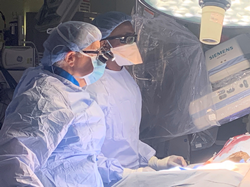
Dr. Sean O’Donnell (left) and Dr. Brijesh Mehta perform the first TCAR procedure in Broward County in 2021.
“This approach is unique in that blood flow is temporarily reversed during the procedure, ensuring any small bits of plaque that break off while the obstruction is overcome are diverted away from the brain, preventing a potential stroke.” – Dr. Sean O’Donnell
HOLLYWOOD, Fla. (PRWEB)
June 29, 2022
The carotid artery in 81-year-old Reynold Zamora’s neck was nearly completely blocked with plaque, impeding the flow of blood to his brain, and significantly increasing the odds the Southwest Ranches resident would suffer a stroke. A carotid endarterectomy (CEA) has traditionally been the recommended intervention, but Mr. Zamora’s age and a recent bout with COVID-19 meant he wasn’t a realistic candidate for the surgical procedure.
The news, however, was far from bleak for Mr. Zamora, since the Memorial Cardiac & Vascular Institute was ready to perform its first TransCarotid Artery Revascularization (TCAR), an innovative and minimally-invasive procedure designed to prevent strokes in high-risk surgical patients with advanced coronary disease.
“This approach is unique in that blood flow is temporarily reversed during the procedure, ensuring any small bits of plaque that break off while the obstruction is overcome are diverted away from the brain, preventing a potential stroke,” said Dr. Sean O’Donnell, medical director of Vascular and Endovascular Surgery at Memorial Cardiac & Vascular Institute. “We then place stents inside the artery to stabilize the remaining plaque and minimize the risk of a future stroke.”
The TCAR procedure is performed by directly accessing the carotid artery through a small incision at the neckline, just above the clavicle. In addition to providing a viable option for those who aren’t willing or able to undergo CEA, there is less scarring, risk of post-surgical complications, and recovery time.
“I had a 99% blockage and was very lucky not to have had a stroke,” said Mr. Zamora. “To be able to have this procedure, walk immediately after, and go home the next day was a blessing.”
More than 400,000 new cases of carotid artery disease are diagnosed each year in the U.S. alone. It is estimated to cause nearly a third of all strokes.
“Mr. Zamora’s procedure was a collaboration between our vascular and neurointerventional surgical teams,” said Dr. Brijesh Mehta, medical director of the Comprehensive Stroke Program and Neurointerventional Surgery at Memorial Neuroscience Institute. “The value of this multi-disciplinary approach was in reviewing the clinical information and imaging studies as a team to decide the most appropriate strategy for opening up the carotid artery. This approach results in the best outcomes for patients with this particular disease.”
That has certainly been the case for Broward County’s first TCAR patient. “I feel 100% better, like a new man,” said Mr. Zamora.
# # #
The Memorial Cardiac & Vascular Institute offers a full complement of services, including preventative, diagnostic, and treatment options tailored to each patient’s specific needs. It features an experienced team of board-certified cardiothoracic and vascular surgeons, medical, and interventional cardiologists that are supported by knowledgeable staff and access to state-of-the-art equipment that help deliver the best possible outcomes.
With its extraordinary medical expertise, advanced technology, and exacting quality guidelines, Memorial Cardiac & Vascular Institute has earned a reputation for superior cardiovascular care. For more information, visit http://www.memorialcardiac.com.
Share article on social media or email:

